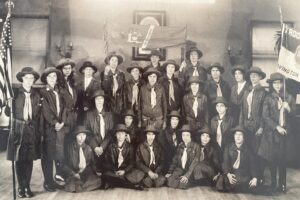The economic crisis officially has spread from Wall Street to Main Street. Actually, 85 Main Street, in Irvington, to be precise.
"It’s not just a headline in the newspaper; it’s real stuff," said Larry Schopfer, the Village Administrator.
"I’ve never seen anything like this."
Schopfer said the meltdown in the market could harm the Village’s ability to borrow money effectively and could raise residents’ property tax rates as more people challenge their assessments as the housing market continues to decline.
The first test of the Village’s ability to borrow money comes as soon as Nov. 14, when the Village is due to borrow a $3 million one-year note, which is a normal and customary financial practice that it does every year for smaller-item capital projects such as sidewalk repairs or the purchase of a sanitation truck or police cars. Every year when the note is due, the Village pays off some of the principal, and then it might borrow some more and carry over the balance to a new one-year note.
"[The credit markets] are not totally frozen, like the headlines," Schopfer said. "I’ve been reassured [J.P. Morgan Chase – the Village’s primary bank] is in a position to bid." But, during a normal year, between four to six banks will bid on the note. This year, Schopfer said the Village’s financial advisors told him to expect between one and two bids.
He also said that there is a complete disconnect between the municipal bond rates and the Federal Reserve, which just slashed interest rates by half a point last week. So, Schopfer said he doesn’t expect the best terms on the loan.
And what if no banks bid on the loan?
"I don’t even want to think about it," Schopfer said, adding that the Village has taken the necessary steps to make sure that doesn’t happen, but there is no way to predict the severity of the worldwide financial crisis four to five weeks from now, "no less four to five days from now."
But in case of the worst, Schopfer said there are alternatives, such as making some kind of payment and then renegotiating with the original lender. Or perhaps the Village could get the loan from an individual investor or an aggregate of residents willing to invest.
On other fronts, Schopfer reassured that the Village is "still in a reasonably healthy financial position." But a recent large certiorari settlement – which wasn’t a result of the housing market since the challenge began in the 1998-99 tax year – could be an ominous sign.
In August, the Village Board of Trustees refunded the owner of the building at 106 North Broadway for $426,490 for tax reductions over a 10-year period. Because of this settlement, the Village had to readjust its 2007 and 2008 budgets. While this was a business – not a residence – and not indicative of the housing market, Schopfer said the Village should expect an increase in residential small claims. In the typical year, there are about 10 challenges; this year, there have been about 50 – a 500 percent increase.
"It gets harder and harder to defend [the assessments] as property values go down," he said "…Anything you lose in the tax base means the remaining taxpayers pay more." Schopfer said he would likely recommend that Village trustees increase the annual appropriation for certioraris in the next budget. Also, he said the Village is currently putting together a summary of all the pending challenges.
On a positive note, Schopfer said the Village is not at all invested in the stock market. Instead, its investments include standard bank deposits, CDs and treasury bills. Also, its deposits above the FDIC (Federal Deposit Insurance Company) limit are collateralized.






